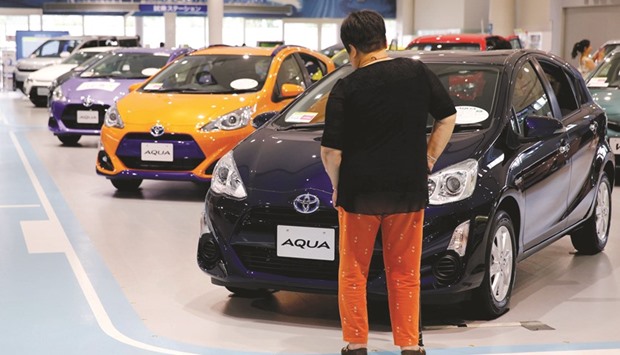Japan Inc is already counting the cost of Brexit. The yen’s extended surge after UK’s decision to exit the EU has turned the outlook for a gain in annual profit to the first decline in four years.
Since the June 23 Brexit vote, the mean forecast for net income at the world’s biggest automaker has slid to $16.5bn, with four analysts cutting their predictions by an average $2.3bn for the fiscal year that started April 1. The referendum outcome triggered the yen’s biggest one-day advance in almost 18 years, taking its gain against the dollar in 2016 to 17%, the most among developed nations.
Profit estimates for Nissan Motor Co and Canon Inc were also cut by analysts after the referendum vote pushed up the yen, paring the value of income from overseas. Concern growth would slow in Europe is also casting a shadow on Japan’s exports and undermining Prime Minister Shinzo Abe’s effort to end deflation and spur expansion. “Abenomics is finished,” said Takuji Okubo, Tokyo-based chief economist at Japan Macro Advisors. “The yen appreciation will be the largest impact from Brexit to Japan. Japanese corporate profits will decline and how much they will decline depends on how much the yen appreciates. There is significant risk the yen could increase very sharply to 90 yen against the dollar.”
Earnings at 200 of Japan’s largest companies would drop about 3.6% in the fiscal year, Daiwa Securities Group Inc estimates, based on the yen averaging 100 against the dollar and 115 against the euro during the year. The currency traded at about 102 yen as of July 5. Should the dollar average 105 yen, current profit would drop 0.5%, Daiwa estimates.
“The yen is strengthening against several currencies and this is weighing heavily on earnings at Japanese automakers,” analysts led by Kota Yuzawa at Goldman Sachs Group Inc, wrote in a report. “We revise Goldman Sachs estimates following the UK’s referendum vote to leave the EU.” The company lowered its Toyota operating profit forecast by 21% to ¥1.78tn ($17.4bn) for this fiscal year.
Toyota shares have slumped about 32% this year, almost double the 18% drop in the Nikkei 225 Stock Average. The stock was little changed on Tuesday.
Toyota said its approach to maintaining production of 3mn vehicles in Japan hasn’t changed, and that its system isn’t dictated by “short-term factors such as exchange rates, regardless of how much the business environment fluctuates.” If analysts are right with their predictions, it would be Toyota’s first drop in profit in five years.
Canon declined to comment. Nissan said it desires exchange-rate stability and it is “always working to create a business structure that minimises exchange-rate volatility.” Suzuki Motor Corp said the Indian rupee and the euro have the biggest impact on its earnings. “We are going to cope with a stronger yen through further cost-cut efforts and local production,” Takashi Iwatsuki, a corporate director in charge of overseas sales at Suzuki, told shareholders at a meeting last week. Wacoal Holdings Corp, a Japanese bra maker that got about a third of profit overseas last year, said it will consider moving its UK warehouse should Brexit cause tariffs to rise.
The prospect of lower profit is also adding to pressure on Bank of Japan governor Haruhiko Kuroda to expand monetary stimulus at the central bank’s policy meeting later this month. Failing to take that step may make the yen rise even further, said Hiroaki Muto, chief economist at Tokai Tokyo Research Center. More conservative profit forecasts would signal bleaker prospects for growth in key export markets including Europe, China and the US Japan’s exports fell 11% in May, an eighth monthly decline as shipments to all three trading partners slumped.
“You’re in trouble if you’re exporting,” said Edwin Merner, president of Atlantis Investment Research Corp in Tokyo. “If the currency changes slowly over a period of a couple of years you can adjust, but if it moves very quickly like it has, you cannot adjust so quickly – it’s pretty serious.” The Brexit vote may cost automakers worldwide about 2.8mn light-vehicle sales through 2018, researcher IHS Automotive said in its latest projections for the industry. Global stock markets that were whipsawed after the referendum may suffer more, according to Olav Chen, who oversees 80bn kroner ($9.6bn) at Storebrand Asset Management, a tactical asset allocation unit of Norway’s biggest listed life insurer.

A visitor looks at Toyota Motor’s Aqua hybrid car at the company’s showroom in Tokyo. Since the June 23 Brexit vote, the mean forecast for net income at the world’s biggest automaker has slid to $16.5bn, with four analysts cutting their predictions by an average $2.3bn for the fiscal year that started on April 1.
